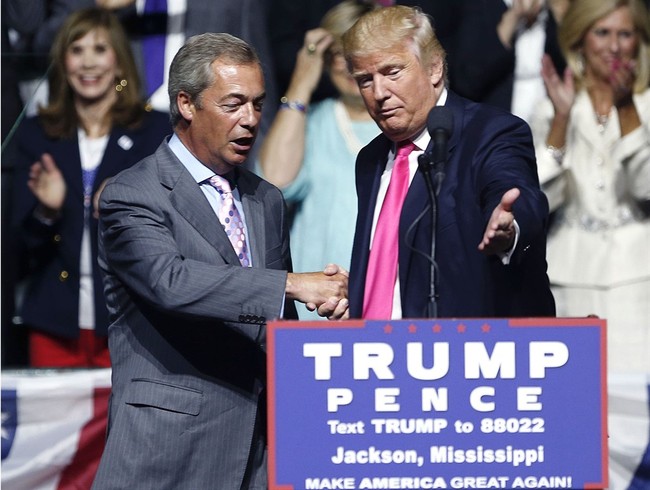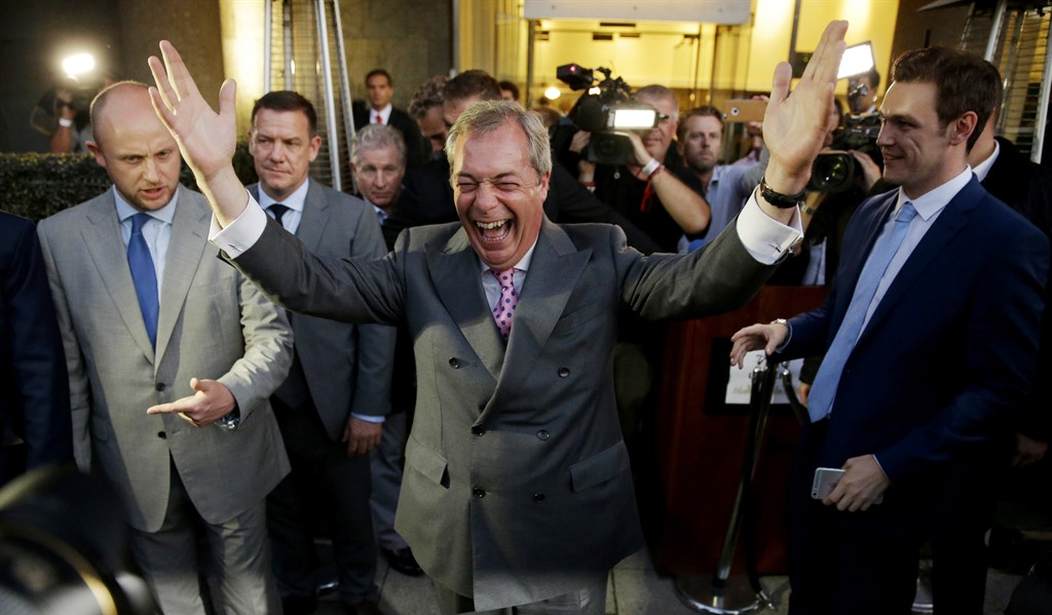The man who pushed and pulled the United Kingdom out of the European Union has emerged as the true leader of British conservatism in the July 4 elections after voters swept the Conservative Party out of power after 14 years.
“This should be the immigration election,” Nigel Farage, the leader of the Reform UK Party and a Parliamentary candidate for Clacton-on-Sea, an Essex County beach resort town halfway between Norwich and London on the English Channel, facing Holland, said in one of his final appeals to the voters.
Farage said he had no hard feelings for the migrants pouring into the country, but it had to stop.
“Most of whom do come are really great people that work hard, but our population's risen by six million since 2010,” he said. “We need to put a freeze on migration.”
When the polls closed, the Sky News/BBC/ITV exit poll projected Labour to win 410 votes with 131 for the Tories.
As the night wore on, the actual results supplanted the projection, with the Tories doing slightly better but with Labour securing the 326 seats for the majority just before 5 a.m. Greenwich Mean Time.
Prime Minister Rishi Sunak has conceded, and Labour's leader Sir Keir Starmer's next move is to meet with King Charles III and request permission to establish a new Parliament.
In losing roughly 200 seats, the Conservatives remain the official opposition party, but the psychic damage to their cause has yet to be calculated.
After Farage was declared the winner for his constituency, he said he was not worried about the number of seats won because Reform UK had an impact in hundreds of races.
"What Reform UK has achieved in those just few short weeks is truly extraordinary, given that we had no money, no branch structure, virtually nothing across the country," he said.
"We are going to come second in hundreds of constituencies," he added. "How many seats we're going to win? I don't know, but we have done this in such a short space of time, which says something very fundamental is happening."
Farage said the voters have no passion for the two main parties and that Reform UK will continue to grow.
"What is interesting is there's no enthusiasm for Labour. There's no enthusiasm for Starmer whatsoever," he said. "This Labour government will be in trouble very, very quickly. We will now be targeting Labour votes. We’re coming for Labour, be in no doubt about that."
In addition to his own constituency, Reform UK is projected to pick up three more seats while finishing second in more than 100 seats. These second-place finishes have no impact on the next Parliament’s final tally, but politically, those Tory, Labour, and Liberal Democrat Members of Parliament each know it is Reform and Farage on their heels—giving the party outsized influence.
One example of how Reform UK twisted up the electoral calculus is in the Essex County constituency of Basildon and Billericay, where Tory Party Chairman Richard Holden won another term by 20 votes.
Holden garnered 12,905 votes to 12,885 votes for Labour and 11,354 votes for Reform UK —effectively splitting the conservative vote in half.
There is no escaping the fact that Reform UK is the ascendant power. Reform's strength is in constituencies where the Tories held sway in the last election — places where voters abandoned decades of support for Labour for the pro-Brexit Conservative Party.
Farage had said he was through with politics but could not stay on the sidelines as the kingdom falters.
“I've come out retirement because Britain is broken, and Britain needs reform,” he said.
“Nothing works anymore, does it? Nothing works,” he said. “The health service, traveling anywhere, trying to get your kids or grandkids to get a house. Rents have gone through the roof. Nothing actually works.”
Polls are now open.
— Nigel Farage (@Nigel_Farage) July 4, 2024
Vote with your heart. Vote for Reform.
pic.twitter.com/KrnMRolE29
Background:
Immediately after Sunak requested on May 22 that the king dissolve Parliament, Farage said he was running for Parliament, but on June 4, he jumped in the fray and began barnstorming the country for his party’s candidates.
Farage said he would have preferred not to run.
“If we had political solutions, I wouldn't mind,” he said. “But a Conservative government for 14 years has raised our taxes, taken away our freedoms, allowed mass immigration on a scale unthinkable in the history of our nation—all of our lives have been damaged by it—and as for the Labor Party, well, it's just more of the same.”
In the last parliamentary elections, held Dec.12, 2019, Conservatives led by Boris Johnson won a handsome majority with 365 seats to the Labour Party’s 202.
Johnson's victory came with expectations of multi-generation majorities, but all of that was for naught as Johnson resigned on Sept. 6, 2022, followed by Elizabeth Truss's short tour as premier until Oct. 22, 2022. Truss was succeeded by Rishi Sunak, who was instrumental in her fall as well as the fall of Johnson.
Sunak’s snap election gambit fails
Sunak held power, more or less, because the party was too exhausted to undergo another leadership fight and to govern.
Johnson was the author of the majority, and he was gone.
Truss was the favorite of the party faithful, which is far more conservative than the Conservative MP’s. When the parliamentary party defenestrated Truss to the curb, it also shattered the bond between voters and the party—especially the new Conservative voters brought in by Brexit and Johnson's appeals to the rest of the kingdom outside of London and her suburbs.
Sunak had three years to turn it around, but he could never flank Labour, which, under Starmer, had trimmed its ranks of the overt anti-Semitics and the fringe personalities blamed for the 2019 loss.
The incoming prime minister may have had a socialist youth, but in his pre-parliamentary legal career, he excelled as a law-and-order prosecutor, so much so that in 2014, he was made a Knight Commander of the Order of the Bath.
Faced with an election forced upon him at the end of Parliament’s maximum five-year term, Sunak stood in the rain outside No. 10 Downing Street and announced a surprise election—hoping to steal a march on the Labour Party—leading in the polls, but not on an election footing.
Sunak's snap election may go down as the worst decision made on British soil since King Harold II tried to sneak up and surprise William, Duke of Normandy, at Hastings.
This is what this election is all about 👇 pic.twitter.com/MgPIsPNUPA
— Rishi Sunak (@RishiSunak) May 23, 2024
It is appropriate that Sunak was standing in the rain because he is of the Tory faction Baroness Margaret Thatcher called "The Wets." The Wets, playing the role assigned to RINOs in American politics, were always the Iron Lady's true enemies throughout her 11-year premiership.
Thatcher was taken down by the Wets in a 1990 coup led by her Chancellor of the Exchequer, John Major—and motivated by Major and others wanting to bring Great Britain into the European Union. In 1992, Prime Minister Major signed the Maastricht Treaty to bring the UK into the EU—and it was that treaty that led to Farage resigning from the Conservative Party.
Fysh: Reform sapped off Tory voters
Marcus John Hudson Fysh, a Conservative member of Parliament for Yeovil, an ancient town built on an old Roman road in southwest England’s Somerset County, said on an X-Space hosted by British journalist Sulaiman Ahmed that he privately warned Sanak and other Conservative leaders that Reform UK and Farage were going to cost the Tories the election by splitting the Conservative vote.
Fysh said he felt there was nothing to be gained by speaking about his disagreements with Tory leadership in public, given that the party was already on the back foot.
“The fact that the right of politics, the center-right of politics, is split means that Labour wins and the Liberal Democrats win in places, too,” the banker said.
“There's a very substantial percentage of the population that sort of believes in those small ‘c’ conservative things,” he said. I don't think there is a future for a center-right party in the UK that doesn't manage to bridge that gap—and that means doing conservative things.”
Fysh said Tory leaders did not make an effort to demonstrate to conservative voters that they were going to fight for their values.
“It means, for example, making the most of the independence and the freedoms that we have since having left the EU,” he said. “I think until there's a center-right party, which is able to convincingly articulate that it's going to do those things, including that independence properly, then I don't think it's possible for it to win again.”
Former parliamentarian Sir Charles Ashley Rupert Walker, who represented Broxbourne in Hertfordshire, appeared on LBC's election night coverage and also blamed Farage for the Conservatives' bad night—because if Sunak had waited for the fall, Farage would have been stumping for President Donald J. Trump.
“I think the real issue here is the timing of it,” said Sir Charles. “It looks like we would've been far better advised to go in November because the marauding Nigel Farage would've been sharpening his horns in the US and not in Britain.”
The real story of the election was the effect of Farage and his Reform UK candidates, he said.
“His engagement in the general election has had a significant impact on the Conservative Party and the result that we're all seeing to unfold tonight.”















Join the conversation as a VIP Member